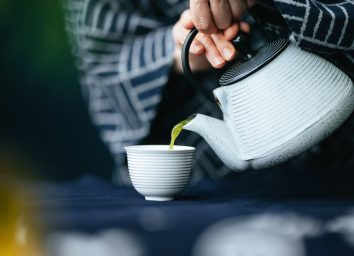What Happens to Your Body If You Drink Tea Every Day

Tea is one of the most beloved drinks on the planet. Some people drink it with breakfast, some to wind down before falling asleep, and some share cups with loved ones in the afternoon with their favorite snacks. With people all over the globe consuming this beverage—some for thousands of years—it raises the question of what type of health benefits tea can offer, and if there are any negative side effects to drinking it as well.
We talked with registered dietitians about what drinking tea every day can do to your health. Most of these benefits or side effects are linked to specific types of tea, but there are a few that can be said for tea in a more generalized sense. For example, green tea is known as being one of the healthiest types of tea because of its specific antioxidants, so it can offer certain benefits that other herbal teas may not. Similarly, herbal teas can be unique depending on the flower they're sourced from, so each kind will differ in what it provides.
We were intrigued by this popular drink, so we asked all the necessary questions to uncover what drinking tea every day actually does to your body. Read on, and for more on popular drinks and their effect on your health, check out What Drinking Wine Every Day Does To Your Body.
Tea can help your heart.
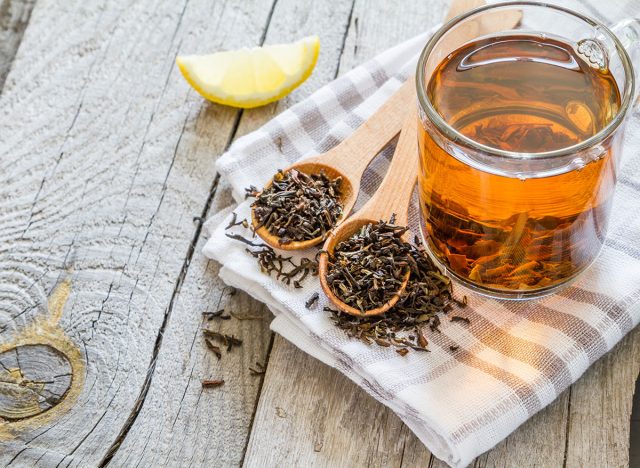
Waking up to a cup of tea or enjoying a mug full before bed may be doing more than just satisfying your cravings. In fact, some tea can help keep your heart healthy.
"Certain teas, such as black tea, green tea, and hibiscus tea, have been associated with improvements in heart health, and they may help lower blood pressure, reduce LDL cholesterol levels, and enhance overall cardiovascular function," says Amy Goodson, MS, RD, CSSD, LD.
Specifically with black tea, you'll be giving your body "helpful compounds like theaflavins and thearubigins, which can help lower bad LDL cholesterol levels and reduce the risk of heart disease," says Trista Best, MPH, RD, LD at Balance One Supplements.
It can improve your cognitive function.
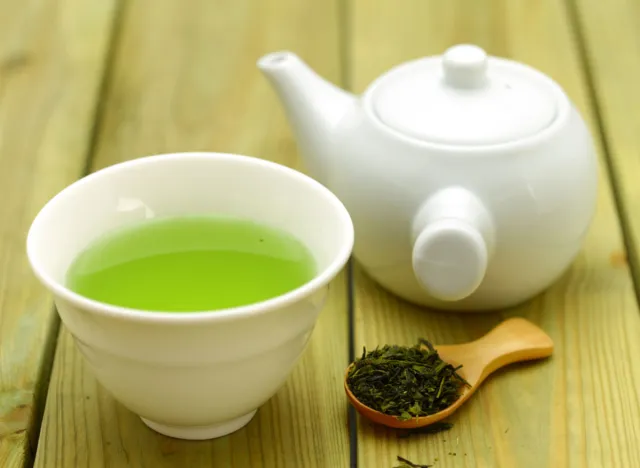
Green tea drinkers will be happy to know that their tea habit may be giving their brains a boost. "This tea contains L-theanine, an amino acid that works synergistically with caffeine to provide a smoother and more sustained energy boost, improving alertness and cognitive function," says Best.
These cognitive benefits don't just come from green tea, though. "Caffeinated teas can also provide a mild energy boost and improve alertness and cognitive function," says Goodson.
Tea may help with digestion.

When you're struggling with an upset stomach or digestive issues, certain teas can help bring you more ease. "Herbal teas such as chamomile, peppermint, and ginger support digestive health and help alleviate symptoms of bloating, indigestion, and nausea," says Lisa Young, PhD, RDN.
Not only can tea help immediately provide digestive relief, but it can also help with gut health and digestion over time. For example, "black tea's tannins may have mild antibacterial properties that can support gut health by promoting the growth of beneficial gut bacteria," adds Best.
You'll get an extra dose of caffeine.
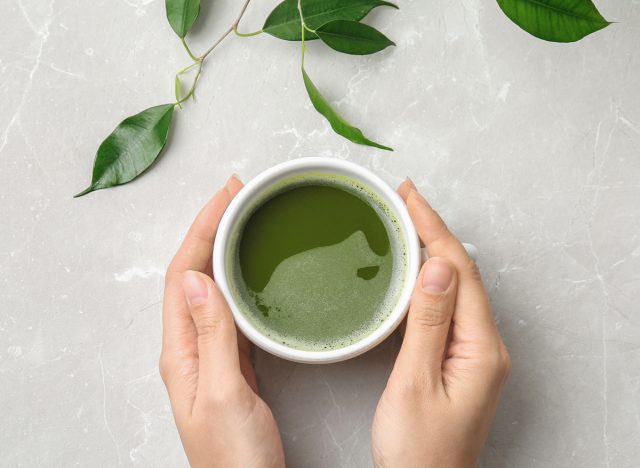
Some teas, depending on the type, contain a decent amount of caffeine. Teas like black, green, and oolong come caffeinated, while herbal teas are completely caffeine-free. If you know you're sensitive to caffeine, you may want to be mindful of the type of tea you're drinking, and at what time of day you decide to take your tea break.
"Even though tea generally contains less caffeine than coffee, excessive consumption can lead to side effects like jitteriness, increased heart rate, and difficulty sleeping," says Goodson. Young adds that, "High consumption of these caffeinated teas may disrupt your sleep cycle and sleep quality thus it is important to drink in moderation."
It can help you relax.
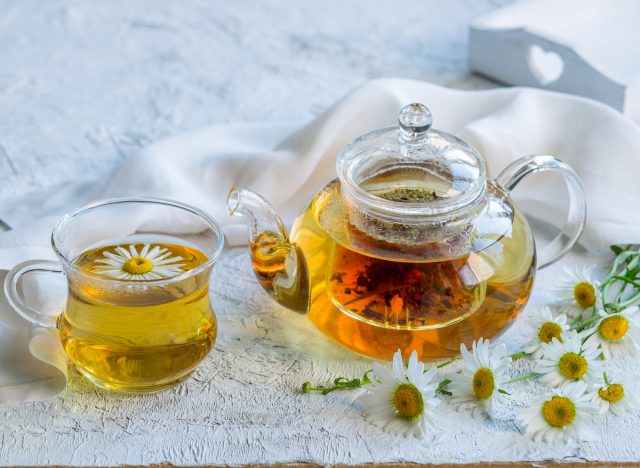
Chamomile tea, which is made from dried chamomile flowers, is specifically used for sleep and calming purposes. "This tea is known for its calming effects due to the presence of apigenin, an antioxidant that binds to certain receptors in your brain, reducing anxiety and promoting relaxation," says Best.
When it comes to your sleep, "Drinking chamomile tea before bed may help improve sleep quality and duration, thanks to its sedative properties that can induce a feeling of drowsiness."
You'll get more phytonutrients.

Tea is packed with nutrients that you don't get in many other beverages, especially coffee.
"Teas contain a variety of phytochemicals and phytonutrients since they are coming from different types of plants," says Amanda Sevilla, RDN. According to the National Library of Medicine, phytonutrients are common plant nutrients that produce certain biological activity and support human health in many different ways.
Another term for phytonutrients is antioxidants, and according to Young, "Tea contains high antioxidant levels to help neutralize free radicals and reduce cellular damage in the body." Best adds that "Green tea is rich in specific antioxidants called catechins, which help to neutralize harmful free radicals in your body, reducing oxidative stress and lowering the risk of chronic diseases."
You can regulate your metabolism.
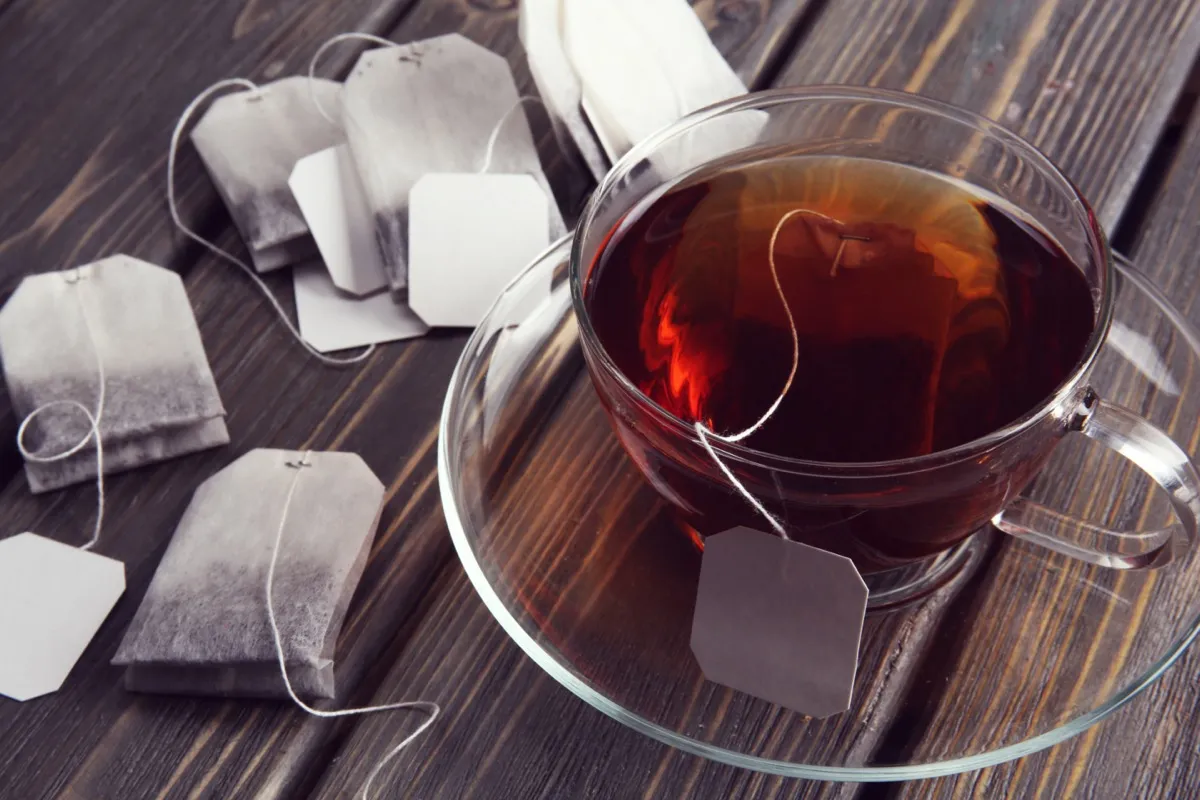
There are even certain teas that help you regulate your metabolism if it's been off balance for various reasons. A study published in the Journal of Research in Medical Sciences states found that green tea specifically has a positive effect on regulating metabolism, which is also directly correlated with controlling glucose levels and weight management. The study found this to be true for diabetes patients, as well.
Sevilla says that if you want to drink tea for the purpose of recentering your metabolism, try drinking black, green, or oolong tea.
You can lower inflammation.

Sevilla says that tea is also commonly known for its anti-inflammatory properties. According to a study from the International Journal of Molecular Science, there is a hefty amount of research that can prove the positive anti-inflammatory benefits to drinking tea on a regular basis. This study in particular looks at green tea and black tea. What researchers discovered is that the properties found in green and black tea can have an enormous impact on lowering inflammation in red blood cells. They even found that people with lupus who consumed green tea on a daily basis for 12 weeks, reported less inflammation in their bodies.
You may need to use the bathroom more.

There are certain types of teas that actually cause you to urinate more frequently. Sevilla explains that Dandelion tea, green tea, barley tea, and hibiscus tea all have diuretic properties. Diuretics are the nutrients that cause our body to get rid of salt and water in the form of urine. Tea with diuretic properties is often recommended for people with kidney issues, diabetes, or certain heart problems. Because of the strength of diuretics, Sevilla suggests avoiding these teas after 4 p.m., unless you want to spend your night going to the bathroom!
It can help with weight control.
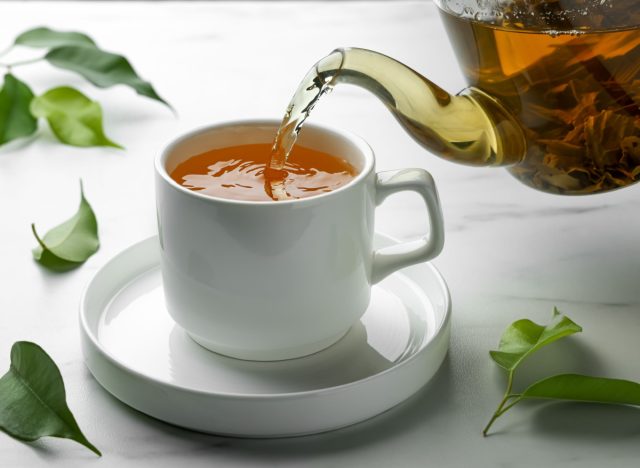
There has been plenty of research done on the positive effects of daily green tea consumption on weight control. According to the International Journal of Molecular Science, a 12-week study on the daily consumption of green tea in women showed a significant decrease in weight and fat around the stomach area. The reason behind this is largely due to the increased energy levels people have reported with green tea, as well as metabolism control and help with lipid production.




